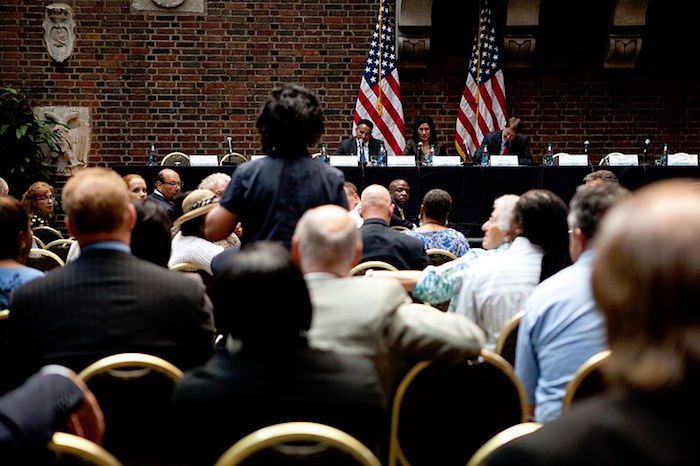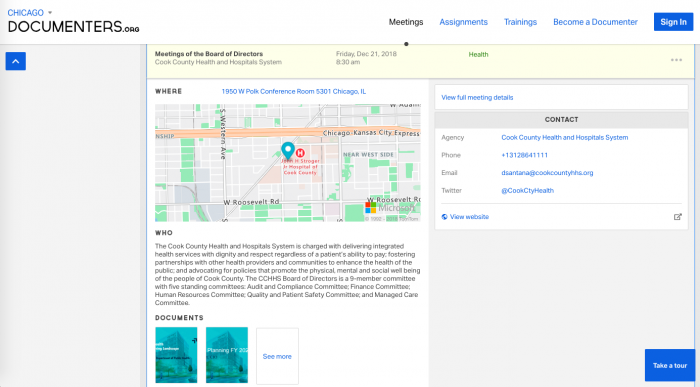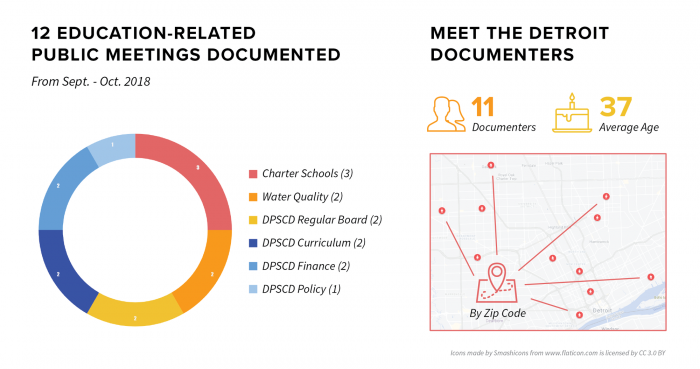
Public meetings — now there’s an app for that.
We’ve seen relationships between news organizations and news consumers expand from tossing in a few bucks for a subscription to chipping in a few more for the journalistic mission to even volunteering their services in support of the news cause. City Bureau’s Documenters program has taken another tack, coaching and paying $15/hour to residents to attend and record notes from public meetings to build a stronger public record — and asking volunteer civic coders to help construct its scraping system.
Now its tool for scraping, tracking, and documenting meetings is centralized and accessible for anyone else who wants to use it — but the journalists are still trying to figure out the best way to incorporate it into newsroom workflows.
“We’re able to source that information and summarize it and package it in a way that allows organizations to get at it earlier, when people can still attend a meeting, call a mayor, convene a group of their block club around an issue,” Darryl Holliday, City Bureau’s cofounder, said. (City Bureau is supported by organizations like the MacArthur Foundation, individual donors, and its Press Club membership, for which I pay $8/month.)
Here’s what the tool looks like (on desktop — go to documenters.org to poke around:


First @city_bureau #PublicNewsroom in Detroit with @wdet and @CitizenDetroit kicking off our Detroit Documenters pilot.
Warming up the room by having folks share what they love and would change about their city: pic.twitter.com/7nUUeE3bQs
— Andrea Faye Hart (@lenifaye) August 13, 2018
Holliday and Michelle Srbinovich, WDET’s general manager, had warned of meeting fatigue among the city’s residents. But Candice Fortman, WDET’s marketing and engagement manager, who spearheaded the partnership, said the battle was “meeting fatigue without any noticeable solutions. I don’t think that people are not motivated to go to meetings; I think they’re motivated to go to meetings when they understand the purpose of them and they also understand what action they can take after coming out of them. For Documenters, their action is to go back home and complete the notes.”
In addition to the app, City Bureau is developing a weekly watchdog newsletter of news tips from the scraping and documenting compiled by a local reporter on a contract basis — and will potentially charge for it. The scrapers, though, are open source.
Hi, I'm Grenadine. I’ll be live-tweeting the regular meeting of the Detroit Public Schools Community District Board of Education at MLK High School on the East Side #DetroitDocumenters @city_bureau
— Dr. Pepper Hot Tub (@grenadine) September 11, 2018
4.04 (approval of additional expenditures) included a discussion of where the funds will go. Appears it will go towards air and water testing and demo of Duke Ellington School.
Note- this is also the same company (ATC Group) that provides hydration stations in DPS schools.
— SoulRepublic (@SoulRepublic) October 26, 2018
Vassillis Jacobs, a senior policy associate at Citizen Detroit, worked on his organization’s Observers program, a Detroit predecessor to Documenters that started about a year ago. They helped about a dozen residents find and attend public meetings of interest to them— without pay, as volunteers. Citizen Detroit wasn’t on the first grant but was introduced to City Bureau by the Knight Foundation as a common funder and shepherded some of its Observers to the Documenters program.
Detroit Documenters have an average age of 37 and many came on board because they were familiar with WDET, Fortman said. Eleanore Catolico is in her 20s and moved to Detroit, and her home state, in April after spending ten years in Chicago and getting involved with City Bureau in 2015. She has a day job outside of journalism and freelances on the side but went to a charter school board budget meeting in October as a Documenter.
“It’s a great outlet for me to get engaged and involved in a capacity where I feel safe and supported to learn more about politics and be more engaged, without feeling self-conscious that I’m still learning,” she told me. “I grew up in Michigan, and growing up I heard ‘you stay in the suburbs’…. There’s still a very strong anti-Detroit bias that’s percolating. The work of Documenters is working to subvert that.”

WDET, City Bureau, and Citizen Detroit recently were awarded a $76,000 grant from the Community Foundation of Southeast Michigan to continue Documenters in 2019. But as the first traditional newsroom partner, WDET is still sussing out how to use the Documenters’ efforts as part of its 12-person news operation.
“Will there be a reporter in your newsroom working directly with the content that comes out of those notes? Is there a commitment to using those notes in a way that informs your reporting in any way? Is it a project of your newsroom or is a part of your newsroom?” Fortman said, suggesting questions other news organizations can consider with Documenters. For WDET, “it is a project of our newsroom.”
That fluctuation, Holliday, said, is intentional — Documenters isn’t supposed to be all about the benefit to the news outlet: “The goal is not to produce content for media outlets. It’s to repair broken bridges with local government, to get people to the meetings, get their voices heard, and figure out the line between where the active citizen and journalist is.”
The program also helps remind those leading the public meetings that someone’s watching: “Somebody went to a charter school board meeting — rarely do the public go to those — and the board was very concerned where the information would go,” Jacobs said. “We had other boards that were offering water, asking if you’re comfortable, [and] one even asked an Observer to come sit at the table to be part of the discussion.”